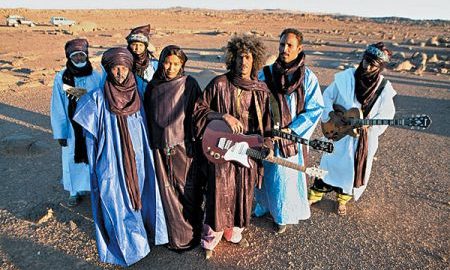Dakar – Mali looks like two countries, at least for the time being. One part, in the South, lost its elected government in a coup d’état on March 22, in which president Amadou Toumani Touré was chased from the power he was going to relinquish anyway in April. The soldiers have since agreed to hand power back to a civilian interim leader, before presidential elections are held. In theory.
by Bram Posthumus
The other part, in the North, has seen the departure of the Malian army, handing most of the territory to an armed Tuareg rebellion. This is an old phenomenon. Tuaregs tolerate others on their patch but they don’t like people interfering with their lives. This the French found out, who were faced with an armed rebellion as far back as 1894 and again in 1916.
Taking its cue from the former colonial power, the Malian government continued crushing Tuareg uprisings, for instance in 1963. Here’s the video of the Tinariwen song dealing with that event:
Today’s movement, under the banner of the MNLA (Mouvement Nationale de Liberation de l’ Azawad – more about that later) has been more successful than all the others. This is partly due to better organization, partly due to much clearer demands and mostly due to massive amounts of heavy arms, brought in from Libya after the death of Colonel Muamar Ghadaffi, in whose army some Tuaregs fought. On April 6, the MNLA announced the independence of what they consider their country: Azawad. And like any new nation, Azawad needs a national anthem. Reportedly, this is the suggested theme song for the new country:
Imidiwan Segdet, by Tinariwen. Before moving to the question what all this means, let’s very quickly try and complete the picture of northern Mali.
Because apart from the MNLA, the North of Mali is the scene for a whole bunch of other armed groups. They have widely differing agendas but similar economic mechanics, which do include trade, smuggling and kidnapping. There are armed Islamist groups that spilled over from the civil war in 1990s Algeria. Known as Al Qaeda in the Islamic Maghreb, they want to establish a Sharia sate. There also is a homegrown Islamist group called Ansar Dine (according to the MNLA this is a government creation) and there is a large and varied collection of armed bandits.
There is also the Malian army but as we mentioned, they lost the entire North after their March 22 coup.
On to Tinariwen. They have been touched by the new rebellion. Some, including the flamboyant lead singer Ibrahim Ag Alhabib, reportedly have taken refuge and are taking care of their families and so the band is touring the world without him. See this short report on Hong Kong television here (subtitles in English)
The heading of this clip is “Tinariwen supports Azawad.” And that stands entirely to reason. As this thoughtful piece in the New Yorker magazine shows, the armed struggle has been part of Tinariwen’s DNA even before the group was founded.
But apparently, for some at least, this is problematic. In a short piece, Afropop Worldwide chastises essentially itself for having built up Tinariwen as Rock Rebels. Well, that’s the music industry for you. It is quintessentially interesting in pushing units out the door and if that takes image building – and the band apparently has been willing to comply – then the background is interesting to the extent that it serves that commercial purpose. Which then, in Afropop’s editorial, somehow becomes ‘colonialist and Western-centric’. Read it here.
This is not Tinariwen’s problem.
Even more bizarre is the claim, made on the website Africa is a Country that Tinariwen’s desert blues (by the way, also a convenient moniker invented by the music industry) is somehow “the white man’s blues”. How? Well, you see, the Tuaregs did not want to be ruled by black people, just like the redneck whites in the South of the USA. See the similarities?
Er, no. This is a serious case of projection and, once again, not Tinariwen’s problem. Throughout their career, the band have never made a secret of their background, their sympathies and their political affiliations. The band have never been “desert rebels” or “white bluesmen” or whatever other moniker you care to use. They have never been any other than they said they were: militant musicians telling about the Tuareg people and their aspirations.
Whether or not Azawad will succeed is another matter. Whether or not the politics of the MNLA are the right ones is up for debate. Whether or not the cause of the Tuareg people is served by a military move is up for debate.
Right now there are tensions between the two dominant agendas in northern Mali: an independent secular Azawad republic on the one hand; Sharia law on the other. The fights between these tendencies are real and happening. There are also latent tensions among the various groups in the region even though they mostly manage to co-exist peacefully. There are definitely tensions in and between northern and southern Malians, having resulted in large refugee movements: from the North and the South (including Bamako) to neighbouring countries.
But none of this has anything to do with “our” sensibilities about appearing “white”, “colonial”, “racist” or “Western-centric”. Tinariwen never needed a “narrative”, to use that odious phrase. “We” did.
Enjoy the show. April-May in Europe. June in the USA. July back in Europe again. Check their website for details. And on this website you can find more information about Mali and Tinariwen.

2 thoughts on “The meaning of Tinariwen”
Comments are closed.